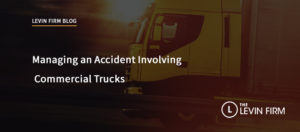 Traffic accidents involving commercial trucks, including tractor-trailer rigs, cause thousands of injuries each year. If you were in a traffic accident in the Philadelphia area that involved a commercial truck, seek professional assistance to deal with the complicated liability issues that will arise. Protect your rights and explore your compensation options. The Levin Firm Personal Injury Lawyers can help. Take advantage of a free consultation. Contact us at (215) 825-5183 or through our online contact form.
Traffic accidents involving commercial trucks, including tractor-trailer rigs, cause thousands of injuries each year. If you were in a traffic accident in the Philadelphia area that involved a commercial truck, seek professional assistance to deal with the complicated liability issues that will arise. Protect your rights and explore your compensation options. The Levin Firm Personal Injury Lawyers can help. Take advantage of a free consultation. Contact us at (215) 825-5183 or through our online contact form.
Accidents Involving Commercial Trucks Present Complicated Liability Issues
According to National Highway Traffic Safety Administration statistics, crashes involving large trucks in 2014 killed 3,903 persons and injured about 111,000. Almost three-fourths of those killed or injured in those accidents were the occupants of passenger vehicles involved in the crashes.
Unfortunately, statistics from the Federal Motor Carrier Safety Administration indicate after years of decline, accidents involving large trucks and buses started to increase again.
Because of the complicated ownership issues and hiring practices involved in the motor shipping industry, accidents involving tractor-trailers pose interesting liability questions.
Truckers may work under shipping companies’ permits and even company logos, colors, and brands. Relatively few drivers are actual employees of a shipping company, however. They generally work as independent contractors who own their rigs and pay for their own fuel, repairs, and licensing fees. They contract with shipping companies to haul loads but choose the routes and schedules on which they operate. If they don’t want to carry cargo on a motor carrier shipping company’s desired schedules or routes, they decline the contracts and find ones more to their liking.
Complicating things further, the trailers pulled by the tractor-trailers generally are owned by another entity separate from both the shipper and the trucker. The cargo is usually owned by yet another entity. In all likelihood, each these entities have different insurance companies.
Until relatively recently, then, the shipping company—also known as the motor carrier—would argue that because the driver was an independent contractor, the motor carrier did not bear liability for any accident that might arise out of a driver’s negligence or fault. This would force an accident victim to file a claim against a truck driver—usually through the truck driver’s insurance company—and attempt to get compensation that way. The disadvantage of suing an individual, even one with insurance, versus the shipping company, is obvious.
Suing all of the entities involved in shipping the load carried by the truck involved in your accident can yield a larger amount of compensation, but can prove complicated and expensive, and involve complex legal issues.
The Independent Contractor Exception for Motor Carrier Liability No Longer Applies
Fortunately, at least from the perspective of people involved in traffic accidents where truck drivers are at fault, Federal Motor Carrier Safety Administration regulations eliminated the distinction between independent contractors and employees with respect to motor carriers and liability. All drivers for a motor carrier company, including independent contractors, are now deemed statutory employees of the motor carriers. The motor carriers now bear the ultimate liability for any accident in which their drivers are at fault.
Accidents Involving Commercial Trucks Still Present Complicated Liability Issues
The very size of tractor-trailers also creates one of their most dangerous characteristics: blind spots. Every car has blind spots, but passenger vehicles are smaller, and so are their blind spots. Passenger vehicle drivers can easily check their blind spots.
This is not the case with tractor-trailer drivers. In fact, it is impossible. Tractor-trailer blind spots, depending on the size of the truck, can extend as much as 200 feet behind the rig. Blind spots on either side of the rig extend well beyond the end of the trailer, and depending upon the make and model of the semi hauling the trailer, as far as 20 feet in front of the semi. Liability issues become complicated when it is literally impossible for a truck driver to know whether a passenger vehicle is there.
Avoid Truck Blind-Spot Accidents
Passenger vehicle drivers must take defensive measures to avoid accidents that might occur because a truck driver can’t see them. These measures include:
- Do not cut closely in front of a tractor-trailer. This might put you in a blind spot where the truck driver cannot see if you are there.
- Avoid holding a position next to a tractor-trailer. If you find yourself driving next to a truck, either pass the truck or fall back to a position where the truck driver can see you. Where possible, pass on the left, where the truck driver’s blind spot is smaller. The blind spot on the right is much larger. If you can’t see the driver’s face in his side mirror, he can’t see you.
- Keep a safe distance when driving behind a tractor-trailer. If you can’t see the truck’s side mirrors, the driver can’t see you.
If a Commercial Truck Injured You in the Philadelphia Area, Contact the Levin Firm
If you suffered a personal injury in a traffic accident involving a commercial truck in the Philadelphia area, protect your rights and explore your compensation options. The Levin Firm Personal Injury Lawyers can help. Contact us at (215) 825-5183 or through our online contact form.